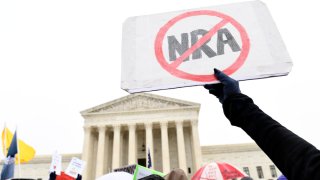
Chief Justice John Roberts appeared Monday to be the key vote in whether the Supreme Court considers expanding gun rights or sidesteps its first case on the issue in nearly 10 years.
The court's dismissal of the case would be a disappointment to gun-rights advocates and a huge relief to gun-control groups. Both sides thought a conservative Supreme Court majority fortified by two appointees of President Donald Trump, Justices Neil Gorsuch and Brett Kavanaugh, might use the case to expand on landmark decisions from a decade ago that established a right to keep a gun at home for self-defense.
The arguments dealt with a dispute over New York City restrictions on taking licensed, locked and unloaded guns outside the city limits. New York has dropped its transport ban, but only after the high court decided in January to hear the case.
The justices spent most of the hour trying to determine whether anything is left of the case brought by the National Rifle Association's New York affiliate and three city residents, after the change in New York law.
Roberts sought assurances in a handful of questions to the city's lawyer that New York police would not refuse to issue gun licenses to people who have may have violated the old law.
"Would the fact of a violation of the prior law be used against them?" Roberts asked Richard Dearing, the lawyer representing the city.
"It will not. It absolutely will not," Dearing replied, as part of his argument urging the justices to get rid of the case.
U.S. & World
Stories that affect your life across the U.S. and around the world.
The four liberal justices made clear they are likely to vote for dismissal. "So what's left of this case? Petitioners have gotten all the relief they sought," said Justice Ruth Bader Ginsburg, on the bench for the first time since a recent two-night hospital stay.
Paul Clement, representing the gun owners, said his clients are entitled to an order from a federal court, not just the representations of the city's lawyer. In one example, Clement said it is unclear whether a gun owner headed to a shooting range could stop for coffee or a bathroom break without breaking the law.
His argument appeared to win favor with at least two conservative justices, Samuel Alito and Gorsuch. When Dearing said coffee and rest stops are permissible, they asked about whether a gun owner would be at risk by stopping at his mother's house.
Dearing replied he was less sure about other kinds of stops, but that people could challenge such a restriction in a new case.
Justice Clarence Thomas, who has lamented the court's reluctance to take on gun cases, asked no questions, as is his custom. Kavanaugh also was silent throughout the arguments, but his record in guns cases includes a dissent when his federal appeals court upheld the District of Columbia's ban on semi-automatic rifles.
"Gun bans and gun regulations that are not longstanding or sufficiently rooted in text, history, and tradition are not consistent with the Second Amendment individual right," Kavanaugh wrote in 2011.
For years, the NRA and its allies have tried to get the court to say more about gun rights, even as mass shootings may have caused the justices to shy away from taking on new disputes over gun limits.
The lawsuit in New York began as a challenge to the city's prohibition on carrying a licensed, locked and unloaded handgun outside the city limits, either to a shooting range or a second home.
Lower courts upheld the regulation, but the Supreme Court's decision to review the case caused officials at both the city and state level to scramble to find a way to remove the case from the justices' grasp. Not only did the city change its regulation to allow licensed gun owners to transport their weapons to locations outside New York's five boroughs, but the state enacted a law barring cities from imposing the challenged restrictions.
But those moves failed to get the court to dismiss the case.
The city does contend that what it calls its "former rule" did not violate the Constitution, although Dearing conceded that police determined the rule could be repealed without making New York's streets more dangerous.
He added that police would have to "work harder" to verify that people legally have their guns with them.
That comment prompted a display of the justices' intimate knowledge of the city and surrounding area. Justices Elena Kagan and Sonia Sotomayor are New York natives, as is Ginsburg. Gorsuch spent his college years at Columbia University in Manhattan and Alito worked many years in nearby Newark, New Jersey.
Alito wanted to know why it's harder for police to check on a Manhattan resident with a gun who says he's headed to "a firing range in Jersey City, which is right across the river," than one in the city's Staten Island.
"How about somebody who lives in the north Bronx says, 'I'm going across the border to Westchester County.' That's tougher for you to look into than, 'Yes, I'm going all the way to Staten Island?" Alito asked.
A decision is expected by late June.



